After doing Orangetheory for over 12 months (and hardly seeing any results), I decided it was time to change my diet and start following some decent meal plans.
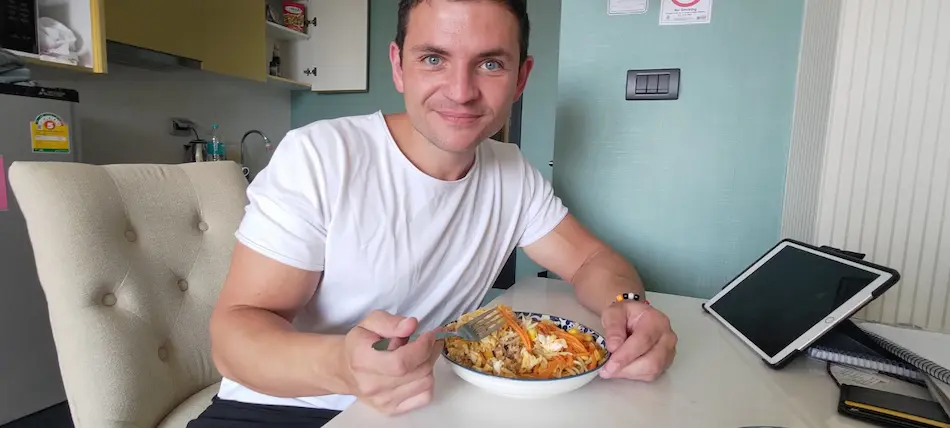
What is Orangetheory Fitness?
Orangetheory Fitness is one of the leading fitness franchises that uses high-intensity interval training.
After months of training, I realized that for optimal results, adding a nutrition plan to my workouts is what I needed.
Unfortunately, Orangetheory Fitness doesn’t offer a personalized diet plan or nutrition coaching.
On their website, I read a handful of articles on what to eat before and after the OTF workout, as well as how much protein should you consume during the day.
Orangetheory and nutrition
According to their website, the Orangetheory suggests that properly nourishing your body is essential and your diet should consist of eating whole foods, ideally without a label.
For the best results, you need optimal nutrition that is moderately low in carbs and emphasizes eating lean proteins and healthy fats.
Basically, all I could find was general information about healthy eating. They advised listening to my body’s inner cues like hunger and satiety.
I started doing Orangetheory and intermittent fasting
I think that Intermittent fasting is one of the easiest ways to reduce calorie intake without counting calories or sticking to rigorous meal plans.
I like this approach because it’s simple, and does not restrict any food groups. I started to listen to my hunger cues, which means I was eating when I’m hungry and stopping eating when I’m satisfied.
Before, I used to eat when I was bored, stressed, or worried. Now, I only eat when I feel physical hunger.
(That was a big win for me.)
Those cues helped me to decide whether I start eating, continue eating, or stop eating. Honestly, I think this approach is relatively easy as it doesn’t require counting calories.
How many calories do I eat on Orangetheory?
Although I rarely count calories, according to MyFitness pal, I eat between 1,800 to 2,500 kcal per day, depending on the day.
I try to eat a little more on my workout days becasue I notice I can train extra harder and I don’t have trouble falling asleep.
On days when I rest, I try to eat a maximum 1-2 meals a day. I find that eating one meal a day helps to tune in to my hunger, and it makes me eat less following days.
For example, before I was doing IF, I was eating 3 big meals, and still feel a little hungry. Now, I can eat half of that, and stay full.
Things I eat on my diet
I used to be a huge fan of ready-to-eat meals because of their convenience. Now I rather spend more time and prepare foods from scratch.
My wife and I started to eat plenty of meat, vegetables, fruits, and whole grains. Although I’m not particularly eager to follow any diet, I would describe our eating style as a mix of paleo and carnivore.
We usually have a lot of broccoli, chickpeas, lentils, and leafy greens, but we also eat pork, fish, tuna, eggs, and dairy products.
Here’s a photo of the tuna that I buy at Costco. (I love to add tuna to most of my meals.)
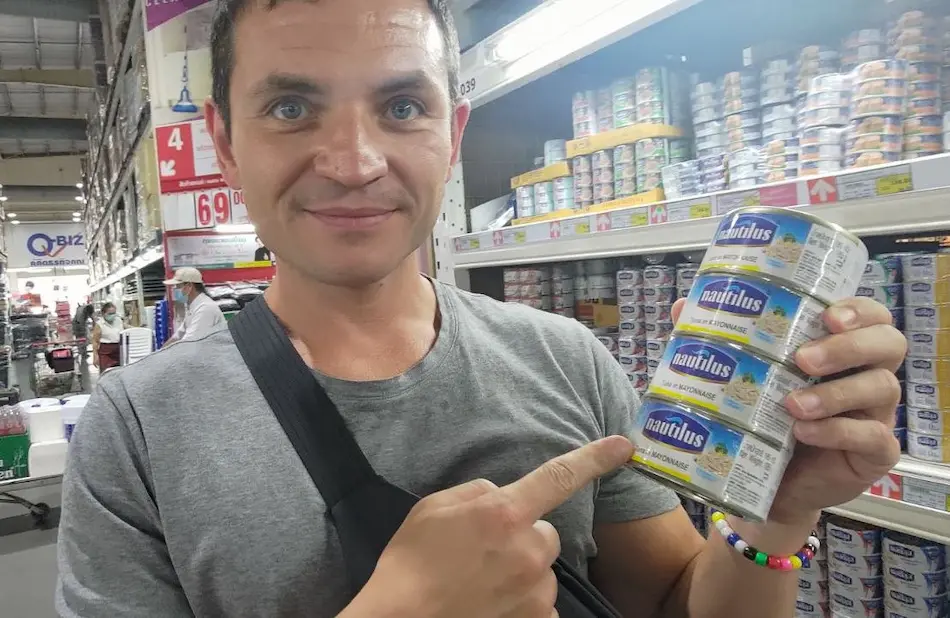
Proteins
I find that proteins keep me full for longer.
And, if I start my day by eating eggs with tuna, my energy for the day is stable. On the contrary, if I eat sugary foods first thing in the morning, I usually crash later or drink too many coffees.
For me, adding protein-rich food to my Orangethery meal plan not only helped me reduce my hunger but also makes the workouts easier.
According to the study from The Journal of Nutrition, “people who did calorie deficit without eating enough proteins had their muscle protein synthesis reduced by 19%.”
My protein list includes foods like:
- Lean meats
- Eggs
- Fish
- Seafood
- Dairy
Here’s how my fridge looks after doing protein shipping in the week.
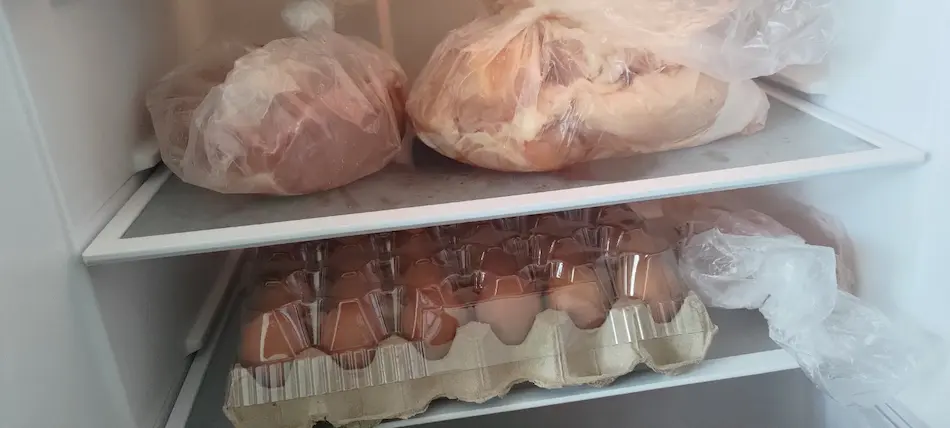
Vegetables
Apart from getting more protein, I also include fiber-rich foods like veggies and fruits. I like to keep things simple, but I cannot stand eating the same foods over and over again.
Here’s a photo of how I stock up on vegetables in my home.
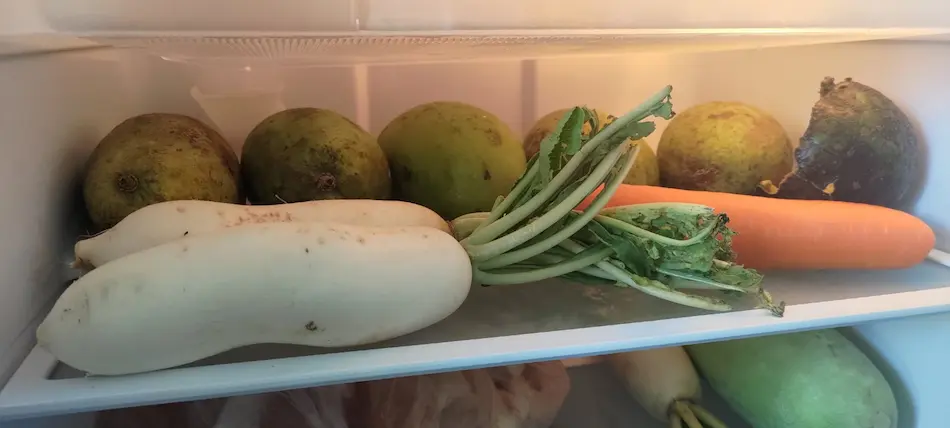
Some of my favorite choices are the veggies that don’t require cooking.
- Radishes
- Potatoes
- Onions
- Garlic
- Carrots
- Broccoli
- Cauliflower
- Lettuce
My wife jokes that our fridge looks like a vegetable stall in the food market.
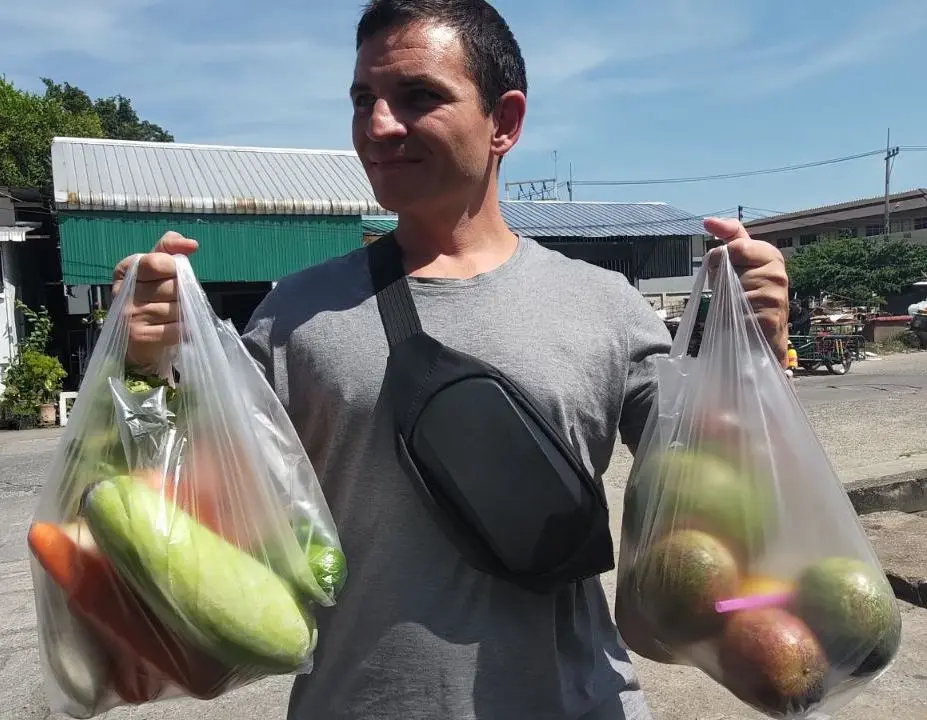
Also, I find that having a variety of vegetables helps to balance my digestion and stomach problems. Before, I was eating a lot of processed foods, and my regularity wasn’t ideal.
Other vegetables we eat a lot include:
- avocado
- lentils
- tomatoes
- chickpeas
- cucumber
- carrots
Healthy fats
I stopped to bring any cooking oils to my home. Before I would buy in bulk and use it to fry my meals. Now, I barely fry anything and switched vegetable oil for extra virgin olive oil or coconut oil.
I often find that taking 2 spoons of coconut oil can not only help with my energy but also increase my satiety.
Things I don’t eat anymore
Some of the foods I try to avoid completely. Others I simply reduced to a minimum.
Sugar
We used to add sugar to salads, soups, and coffee. We also used to buy sodas, but now, I only drink black coffee.
My wife still likes her coke, but she managed to switch to a diet, without sugar.
On the weekends, we like to treat ourselves to something sweet like a dessert, a smoothie, or ice cream.
Processed meat
I used to eat out a lot and my menu consisted of eating hamburgers, salami, hot dogs, and other processed meats. Now, you won’t see me eating any of these.
My fridge is full of chicken, turkey, beef, and pork.
According to the Journal of the American Heart Association, “consumption of processed meats, but not red meats, is associated with a higher incidence of CHD and diabetes mellitus.”
I try to limit my processed food intake as much as I can, especially when heart disease and strokes are common in my family.
What do I eat before Orangetheory?
What I eat depends on when I train.
If I train early then around 30-60 minutes before OTF class starts I typically eat a fruit or small serving of carbohydrates, moderate protein, and low-fat (something like a banana with 1 tbsp of peanut butter).
Snacks I can eat right before an Orangetheory workout:
- Yogurt-based smoothies (of fat-free milk)
- Nonfat Greek yogurt with fruit
- Whole grain toast and a hard-boiled egg
- A handful of nuts and raisins (2 palms of raisins to 1 palm of nuts)
If I train in the afternoon, then 2-3 hours before the class I eat a high carbohydrate, high protein, moderate-fat meal.
I noticed that what I eat around my Orangetheory workouts plays a key role in how I feel and perform.
The closer I eat before a workout, the more I’ll want my foods to be in higher carbohydrates and lower in fats.
One of the OTF instructors says his diet usually includes hard-boiled eggs, potatoes, chicken, rice, and broccoli. He also eats avocados, bananas, and nuts.
What do I eat after the Orangetheory workout?
My post-workout meal is rich in lean protein and starchy carbs. High-protein foods help me to build muscle and carbs help to restore my glycogen.
An egg and chicken salad, a Turkey sandwich on whole-wheat bread, or a banana and plain yogurt are good, easy options.
Here’s a photo of my post-wokrout meal after my Saturday session.
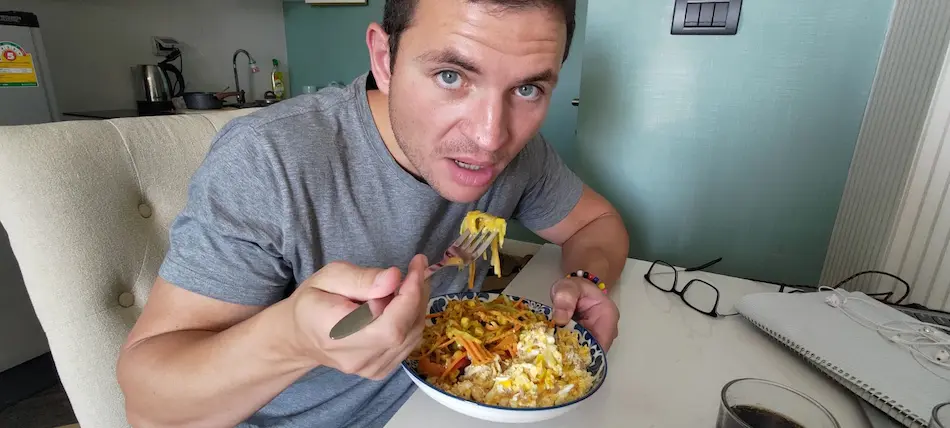
Here I ate scrambled eggs with tuna flakes. For the salad, I had shredded carrot, papaya, and avocado.
Can Orangetheory help you lose weight?
According to the article published in the Frontiers in Psychology Journal, “Orangetheory fitness can help you lose weight because each workout consists of high-intensity interval training, which has been shown to burn fat and build muscle.”
For me, Oragetheory did help with weight loss, but nutrition was the most important.
I don’t say you cannot lose weight with Orangetheory without dieting. I say that dietary restriction can potentially lead to much faster weight loss results.
My wife jokes that we spend months going to Orangetheory every day trying to get in shape when in reality, we could start eating right and get there sooner.
Like us, instead of following a specific diet protocol, you can focus on implementing intermittent fasting strategies that helped us to reduce food intake, without restricting macros or food groups.
Things I do apart from my diet
Here you can find a list of things that helped to enhance my weight loss results with Orangetheory.
I stay active
Physical activity has become a big part of my daily routine. Apart from Orangetheory workouts, I’m constantly looking around for how to add more movement.
I try to do as much walking as possible, choosing stairs, parking the car further away, or going for a jog before my lunch.
I eat slowly
I started to follow John Berardi, Ph.D., advice on eating slowly. Dr. Berardi is the author of the popular online nutrition coaching program, Precision Nutrition.
To be fair, eating slowly was the simplest, yet most powerful tool that helped me transform my relationship with food.
I followed Dr. Berardi’s advice and I started to pay attention to how much time I spent on my meals. Now, I focus to put my fork down between bites and chew a little extra longer than usual.
I also try to eat mindfully without watching TV or other distractions. My goal is to finish my meal no sooner than 15-20 minutes. That’s when I feel full, without even finishing my plate.
I use a food journal
I used to rely heavily on fitness apps like MyFitnessPal where I needed to log in my food intake. Now, I use pen and paper and handwrite what I eat.
I also try to document my emotions, feelings, and physical sensations. (This one helped me to eliminate some food intolerances I had.)
I stay busy
I noticed that when I get bored, I have a tendency to eat more. Therefore, I try to stay busy and do something that keeps my mind occupied. Hobby, reading, manual work, exercise, creative work, etc.
Organize my kitchen
I don’t live in a big house, so cleaning up the clutter was relatively easy. Apart from keeping the fridge full of protein and veggies, we try to not bring home any cookies, sweets, and other foods that are full of empty calories.
I also like to cook, so I have a good set of knives and chopping boards always available. I have a blender, food processor, set of bowls, and other accessories that make cooking hassle-free.
Hydration
For me, there is nothing worse than feeling tired becasue of not drinking enough water. (My wife always reminds me that I’m dehydrated when I kiss her.)
This is something that I still work on, but in general, we keep a lot of water at home. We have a water filer and a couple of water bottles that remind us about hydration.
Going to bed before 10 pm
I used to stay up late into the night, but I found that sleeping earlier made a huge difference.
I no longer have cravings for unhealthy late-night snacks and I have more energy to exercise in the morning.
(This change that I really enjoy.)
Lessons learned
It took over 6 months to notice significant weight loss results. There are a couple of things that I learned from this experience.
First is that doesn’t matter how much I exercise or how intense my wokrouts are, it is very difficult to lose weight without good nutrition.
Second is that losing weight is not only about what I eat. For me, things like sleep, stress management, recovery, and social life also played a huge role.
This means that when I choose a nutrition plan, it should be in line with my own goals and limitations, physical activity level, eating experiences, taste preferences, budget, work schedule, and cultural habits.
Finally, the most important component of any diet is adherence.
